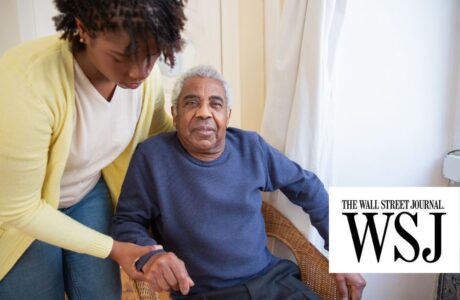
Grieving Someone Who’s Still Here: Understanding Anticipatory Grief
Grief isn’t always a response to finality. Sometimes, it starts long before the last breath is taken, quietly, painfully, and often without acknowledgment. This is what we call anticipatory grief: the emotional process of mourning a loved one who is still alive.
For families facing dementia, terminal illness, or a prolonged decline in health, anticipatory grief is an often overlooked reality. You may find yourself cycling through sadness, fear, anger, or guilt, grieving someone who is still physically with you, but whose essence feels like it’s slipping away.
In this guide, we explore what anticipatory grief is, how it affects spouses and children, and how to talk about it openly, so that the grief doesn’t stay silent.
What Is Anticipatory Grief and Why It Happens
Anticipatory grief refers to the emotions experienced before an expected loss. It often emerges when someone receives a terminal diagnosis, enters end-of-life care, or begins showing signs of cognitive decline.
Unlike traditional grief, which occurs after death, anticipatory grief can feel confusing. You might ask yourself:
- Is it wrong to be grieving already?
- Why do I feel numb, angry, or exhausted?
- Am I mourning or just preparing?
In many cases, it’s both at once. Anticipatory grief is a complex emotional process that includes sadness, anxiety, denial, and even moments of hope. It prepares you for the goodbye, but it doesn’t make the loss any less profound.
Common Symptoms of Anticipatory Grief Before Loss
Everyone experiences grief differently, but here are some emotional and physical signs of anticipatory grief:
- Emotional numbness or detachment
- Sudden bursts of sadness or anxiety
- Guilt for enjoying small moments or wishing for relief
- Anger toward the situation (or sometimes the loved one)
- Trouble sleeping or concentrating
- Social withdrawal
These responses are normal. They don’t mean you love your person any less. They mean you’re human.

How to Support Yourself and Your Family Through Anticipatory Grief
One of the most heartbreaking forms of anticipatory grief is experienced by caregivers, especially spouses and children who support a loved one with dementia or a terminal illness.
Spouses often describe feeling like they’ve already lost their partner: the shared jokes no longer land, the routines have vanished, and the emotional intimacy has been replaced with logistical care.
Children face a different kind of grief: They mourn the parent who once cared for them, now reversed into a role of needing care themselves. For adult children, this can also trigger childhood wounds, complex family dynamics, or the emotional burden of ‘becoming the parent.’
How To Have End-of-Life Conversations with Family
The emotional toll of grieving someone still alive can quietly erode your own health. Here’s how to build a support system around you:
1. Name the Grief
Simply naming what you’re feeling can bring enormous relief. Anticipatory grief is real, and acknowledging it is the first step toward healing.
2. Talk Openly (Even If It’s Hard)
If you can, have conversations about what your loved one wants. What brings them peace? What matters most right now? Use openers like:
- “What do you want your care to look like moving forward?”
- “What memories would you like to revisit together?”
- “Are there any wishes you’d want us to carry forward?”
These conversations can feel heavy, but they can also be grounding and deeply connecting.
3. Get Professional Help
Grief therapists, counselors, and palliative care social workers are trained to guide you through these difficult transitions. You don’t need to navigate this alone.
At Empowered Endings, our Family Support services are designed to walk alongside you. Whether it’s one conversation or ongoing guidance, we’re here to help you feel heard, held, and whole.
4. Create New Rituals
Try introducing small rituals that honor your loved one and your evolving relationship. These could be:
- A nightly candle lighting
- Journaling gratitude for small shared moments
- Revisiting favorite songs, foods, or memories
Rituals give shape to grief and make space for meaning, even amid sorrow.
What Research Says About Anticipatory Grief
Preparing emotionally doesn’t mean giving up. It means honoring the time you have left.
Here are five steps to meaningful conversations:
- Pick the Right Moment: Choose a calm, quiet space where everyone can be present without distraction.
- Use “I” Statements: Express your feelings honestly without blame (“I’m feeling overwhelmed,” vs. “You’re not helping enough”).
- Acknowledge the Elephant: It’s okay to name the reality: “I know we’re facing a hard goodbye. I want us to go through this together.”
- Invite Collaboration: Ask, “How can we support each other better right now?” or “What would feel most loving to do as a family this week?”
- Allow Space for Silence: Not everything has to be solved or explained. Sometimes just sitting together in honesty is enough.
The Science Behind Anticipatory Grief
While anticipatory grief is deeply emotional, it’s also supported by clinical research. Studies from the National Institute on Aging and peer-reviewed journals have shown that families who address grief before a loss experience fewer long-term psychological effects. Naming emotions, receiving support early, and preparing for death proactively can reduce the risk of prolonged or complicated grief after a loved one passes. Preparing for an ending also means caring for your future self.
Complicated Grief vs Anticipatory Grief: When to Get Help
Sometimes, anticipatory grief crosses into what’s known as complicated grief—a prolonged, intense experience that interferes with daily life. If your sadness turns into paralysis, if you feel angry all the time or avoid visiting your loved one, or if caregiving feels emotionally unbearable, it’s a sign to seek professional help. Therapy, support groups, and family counseling can help you process emotions before they become overwhelming. Grief isn’t linear. There’s no shame in needing support along the way.
How to Talk to Kids About Death and Grief Before Loss
Children, especially younger ones, often sense when something is “off,” even if adults try to protect them. Explaining anticipatory grief to children requires honesty wrapped in reassurance. Use simple language: “Grandpa’s body is getting tired, and we’re all feeling a little sad because we know he won’t be with us forever.” Offer opportunities for children to express themselves—through drawing, memory sharing, or rituals. Grief support isn’t just for adults; kids carry their own stories too.
You Are Not Alone: Support for Grief Before Loss
Grief before loss is often invisible, but you don’t have to bear it silently. Whether you’re the caregiver, the spouse, the child, or the friend standing beside someone in decline, your grief is real, and your love is valid. Naming it is brave. Supporting it is essential.
Need support navigating grief before loss?
Visit our Family Support page—a compassionate space designed to help you understand anticipatory grief, build emotional readiness, and feel less alone as you support your loved ones through life’s most difficult transitions.
Together, we can create an empowered end-of-life experience—for the ones you love, and for you.





